‘HOSTILES’ gets an amazing review from “Rolling Stone” magazine

Bale, in a piercing, quietly devastating performance, holds the film's center with commanding authority.
Channeling ‘The Searchers’, Scott Cooper’s story of an embittered soldier escorting a Native chief home is one for the ages
By Peter Travers December 23, 2017
The continuously astounding Christian Bale is one of our best film actors, and he’s at his peak in Hostiles, a powderkeg of a western, written and directed in a soulful fever by Scott Cooper (Crazy Heart, Out of the Furnace, Black Mass).
Working from an unpublished manuscript by the late Donald Stewart, the filmmaker echoes The Searchers – John Ford’s 1956 classic starring John Wayne as a vengeful cowboy – in tackling the way racism and violence seem to be hardwired into the American character.
Bale plays Captain Joseph Blocker, whose life up till now in the Arizona territory of 1892 has been occupied with the systematic slaughter of Native Americans. This tortured man wears his racial hatred like a badge of honor, having witnessed friends and soldiers massacred by so-called savages.
Now with the Indian wars waning and himself on the verge of retirement, Blocker is knocked sideways by the news that President Benjamin Harrison has issued a last command: escort his hated enemy Yellow Hawk (the excellent Wes Studi), a terminally ill Cheyenne chief, to his home in Montana. There, he can die in peace surrounded by family members, played by Q’orianka Kilcher, Adam Beach, Xavier Horsechief and Tanaya Beatty.
Blocker is a voracious reader (Julius Caesar is a favorite), but he’s not a man of words. So he doesn’t shout, “That’ll be the day” when he gets his orders to start on the 1500-mile trek. But you can read the simmering resentment in the captian’s steely gaze and tightly-set jaw. (Bale can say more with one look than another actor can do with a dozen pages of dialogue.) Despite his rancor, this loyal soldier leads his men, played by Jesse Plemons, Jonathan Majors, Timothée Chalamet and Rory Cochrane, on a mission to deliver the chief as promised, safely and without incident.
That’s not the way things work out. Along the way, their party picks up a straggler. She’s Rosalie Quaid (Rosamund Pike), a white settler who has watched her husband and children butchered by attacking Apaches – a scene which Cooper stages with unflinching brutality. Crazed with grief, she can barely acknowledge her tragedy, holding her dead baby in her arms as if her determination alone could bring the infant back to life. The sight of the calvary’s Indian prisoners drive her to thoughts of retaliation, and then of suicide. Both Rosalie and Blocker form a bond that opens their eyes to the qualities they have in common with a people they once found it easier to demonize.
Cooper takes his time (133 minutes) to allow the bruises on both sides to the racial divide to heal instead of fester. After a Comanche attack, it’s Yellow Hawk who tells Blocker to unshackle his people so they can unite in battle, “one for one.” There is no sermonizing. Cooper lets us read his story on the faces of his characters. His trust pays off, even when a wild card enters the scene in the person of Philip Wills (a stellar Ben Foster) as a criminal the men need to escort to justice.
Hostiles is crowded with casualties and a hatred that dies hard. But Cooper lets in a glimmer of hope. In the midst of unbridled ugliness, the beauty of the landscape – shot with a poet’s eye by the gifted Masanobu Takayanagi – suggests a path ahead. Cooper sometimes lets solemnity drag down his film’s narrative drive and the Native characters are developed less fully than their white counterparts, a common failing in the western genre.
But Bale, in a piercing, quietly devastating performance, holds the film’s center with commanding authority. It’s a film whose brute force tempered with contemplative grace. It’s a potent and prodigious achievement.
